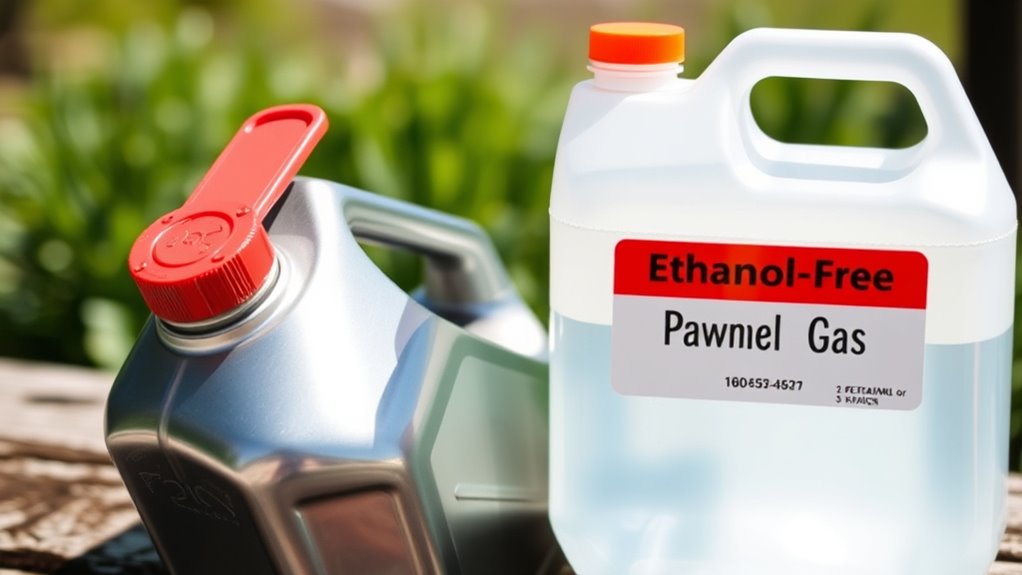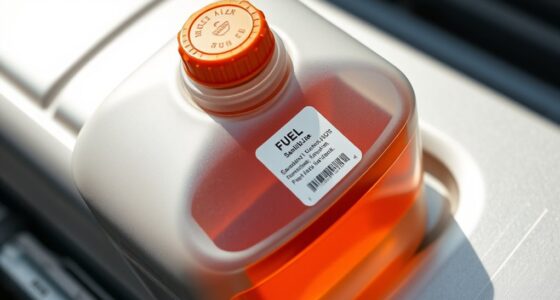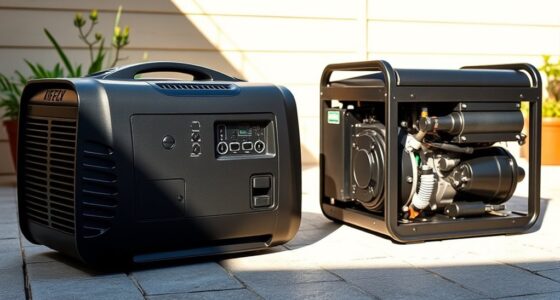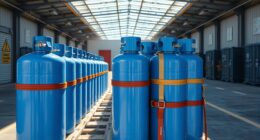Ethanol-free gas is fuel that doesn’t contain ethanol, which helps your generator perform more reliably and stay in better condition over time. Ethanol attracts moisture, causing fuel degradation, corrosion, and starting problems, especially during storage. Using ethanol-free gas reduces these issues, offering better stability, cleaner engines, and fewer repairs. If you want to keep your generator running smoothly during emergencies or long periods of inactivity, it’s worth considering. Keep going to discover more about its benefits and how it compares to regular fuel.
Key Takeaways
- Ethanol-free gas contains no ethanol, reducing moisture absorption and preventing phase separation in fuel tanks.
- It improves engine performance, fuel stability, and reduces the risk of corrosion and deposits.
- Ideal for generators, especially during storage or infrequent use, to ensure reliable startup and operation.
- Ethanol-blended fuels are cheaper but can cause engine issues over time; ethanol-free gas offers longer shelf life.
- Using ethanol-free gas helps maintain engine longevity, reduces maintenance, and ensures better performance during emergencies.
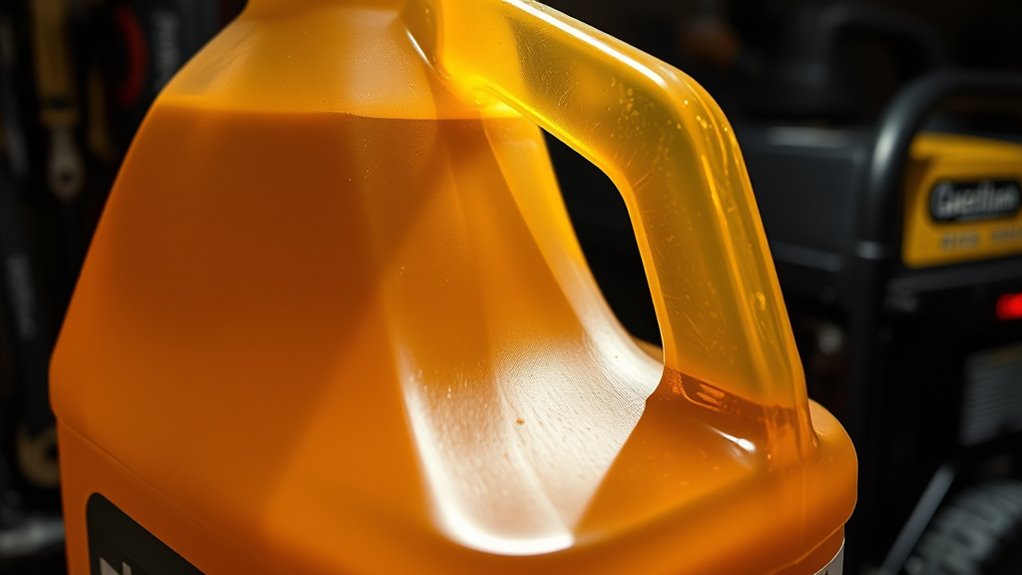
Many vehicle owners seek ethanol-free gas because it can improve engine performance and reduce fuel system problems. Ethanol, a corn-based alcohol added to most gasoline blends, attracts moisture and can lead to issues like corrosion, clogged fuel injectors, and degraded fuel quality over time. When you opt for ethanol-free gas, you’re choosing a fuel that offers better gasoline stability, meaning it resists breaking down or absorbing water. This stability guarantees your engine runs smoothly and consistently, especially during storage or infrequent use. For your generator, which might sit idle for long periods, using ethanol-free gasoline can make a significant difference in maintaining ideal engine performance.
Ethanol tends to attract water, which can cause phase separation in fuel tanks, leading to water accumulation at the bottom. When you use ethanol-free gas, you reduce this risk because there’s no ethanol to absorb moisture. This results in cleaner fuel and less chance of engine knocking, misfiring, or difficulty starting. Since generators often need to start reliably during power outages or emergencies, having a stable fuel source is essential. Ethanol-free gasoline helps preserve engine performance because it burns more consistently and completely, reducing deposits that can clog carburetors or fuel injectors over time. As a result, your generator can operate more efficiently, with fewer maintenance issues related to fuel quality.
Another advantage of ethanol-free gas is that it generally has a longer shelf life. Gasoline with ethanol can degrade faster, especially when stored for months, leading to gum and varnish buildup inside your engine. This buildup hampers performance and can cause costly repairs. By choosing ethanol-free fuel, you’re guaranteeing that your generator’s engine remains cleaner and more reliable, even if you don’t use it regularly. Plus, ethanol-free gas often contains fewer additives, which means less chance of chemical buildup that could negatively impact engine performance.
While ethanol-blended gasoline is usually cheaper and more widely available, the benefits of ethanol-free gas become clear when you prioritize engine longevity and performance. For your generator, especially if it’s used seasonally or stored for emergencies, ethanol-free gas offers peace of mind that your engine will start easier, run smoother, and last longer. By maintaining gasoline stability, you also avoid frequent fuel system repairs, saving you time and money. Overall, if you want your generator to perform reliably and stay in good condition over the long term, using ethanol-free gas is a smart choice that supports better engine performance and fuel stability.
Frequently Asked Questions
Is Ethanol-Free Gas More Expensive Than Regular Gasoline?
Yes, ethanol-free gas is generally more expensive than regular gasoline. You’ll find it has a higher price comparison at many fuel stations, mainly because it’s less common and requires special handling. Availability locations can be limited, often found at specialty or outdoor stores rather than standard gas stations. Although it costs more, many people prefer it for their generators to avoid issues caused by ethanol in regular fuel.
Can Ethanol-Free Gas Improve My Generator’s Fuel Efficiency?
Using ethanol-free gas can boost your generator’s fuel efficiency and engine performance. For instance, if you switch to ethanol-free fuel, you might notice your generator runs smoother and consumes less fuel over time. Ethanol can cause engine knocking and moisture buildup, reducing efficiency. By choosing ethanol-free gas, you help your engine operate more reliably, extend its lifespan, and save money on fuel in the long run.
Where Can I Buy Ethanol-Free Gasoline Locally?
You can buy ethanol-free gasoline at local gas stations that specifically advertise premium or non-ethanol fuel. Many specialty fuel stores also carry ethanol-free options, catering to boaters, RV owners, and generators. Call ahead or check store websites to confirm availability. These sources guarantee you get high-quality, ethanol-free fuel that helps your generator run smoothly and lasts longer. Keep an eye out for labels indicating “ethanol-free” to make the right choice.
How Long Does Ethanol-Free Gas Last Before Degrading?
Ever wondered how long ethanol-free gas stays fresh? Typically, it remains stable for 6 to 12 months if stored properly. To maximize fuel stability, keep it in a sealed, airtight container, store it in a cool, dark place, and avoid exposure to sunlight. Regularly check for any signs of degradation, like a sour smell or varnish, and use fuel stabilizers if you plan to store it longer.
Are There Environmental Benefits to Using Ethanol-Free Gasoline?
Using ethanol-free gasoline offers environmental benefits, as it reduces emissions and is often made from renewable resources. Since it doesn’t contain ethanol, it minimizes the release of pollutants like volatile organic compounds, which contribute to smog formation. By choosing ethanol-free fuel, you’re helping to lower your carbon footprint and promote cleaner air, making it a better option for environmentally conscious users concerned about emission reduction and sustainability.
Conclusion
Choosing ethanol-free gas is like giving your generator a smooth ride on a clear road—less hassle, fewer issues. While it may cost a bit more, it helps prevent clogs, corrosion, and engine problems down the line. Think of it as investing in a reliable companion that’s ready to perform whenever you need it. So, if you want your generator to run like a well-oiled machine, ethanol-free fuel could be your best route.
